| Listing 1 - 10 of 14 | << page >> |
Sort by
|
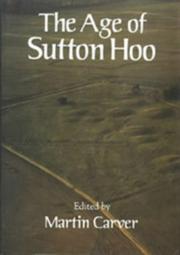
ISBN: 0851153305 9780851153308 0851153615 9780851153612 Year: 1992 Publisher: Woodbridge : Boydell Press,
Abstract | Keywords | Export | Availability | Bookmark
 Loading...
Loading...Choose an application
- Reference Manager
- EndNote
- RefWorks (Direct export to RefWorks)
Angelsaksische beschaving --- Angelsaksische cultuur --- Anglo-Saxon civilization --- Beschaving [Angelsaksische ] --- Civilisation anglo-saxonne --- Civilization [Anglo-Saxon ] --- Cultuur [Angelsaksische ] --- Anglo-Saxons --- Civilization, Anglo-Saxon --- Excavations (Archaeology) --- Ship burial --- Fouilles (Archéologie) --- Kings and rulers --- Death and burial --- England --- Europe, Northern --- Suffolk (England) --- Sutton Hoo Ship Burial (England) --- Angleterre --- Europe septentrionale --- Suffolk (Angleterre) --- Sutton Hoo (Angleterre : Site archéologique) --- Civilization --- Antiquities --- Civilisation --- Antiquités --- Archaeology, Medieval --- Civilization, Anglo-Saxon. --- Ship burials --- Ships, Medieval --- Death and burial. --- Antiquities. --- Sutton Hoo Ship Burial (England). --- Fouilles (Archéologie) --- Sutton Hoo (Angleterre : Site archéologique) --- Antiquités --- Europe [Northern ] --- Suffolk County --- To 1066 --- Anglo-Saxons - Kings and rulers - Death and burial. --- Excavations (Archaeology) - Europe, Northern. --- Excavations (Archaeology) - England - Suffolk. --- Suffolk (England) - Antiquities. --- England - Civilization - To 1066. --- Anglo-Saxons - England - Suffolk. --- Ship burial - Europe, Northern. --- Europe, Northern - Antiquities. --- Ship burial - England - Suffolk. --- Seventh century. --- Mittelalterliche Archäologie --- Nordeuropa --- Sutton Hoo --- Archäologie --- Acqui 2006
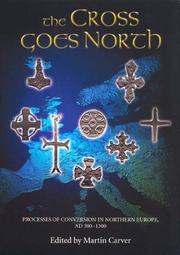
ISBN: 1843831252 1903153115 9781903153116 9781846150586 9781843831259 Year: 2003 Publisher: Woodbridge, Suffolk, UKRochester, NY York Medieval Press ;Boydell & Brewer
Abstract | Keywords | Export | Availability | Bookmark
 Loading...
Loading...Choose an application
- Reference Manager
- EndNote
- RefWorks (Direct export to RefWorks)
Conversion --- Christianity --- History --- Europe, Northern --- Church history --- 266 <4-17> --- 266 "04/14" --- Missies. Evangelisatie. Zending--Noord-Europa --- Missies. Evangelisatie. Zending--Middeleeuwen --- Eglise --- Congresses --- Christianisme --- Congrès --- Histoire --- Europe septentrionale --- Histoire religieuse --- Religious conversion --- Northern Europe --- Psychology, Religious --- Proselytizing --- Conversion - Christianity - History - Congresses. --- Europe du Nord --- Conversions --- Europe, Northern - Church history - Early church, ca. 30-600 - Congresses. --- Europe, Northern - Church history - Middle Ages, 600-1500 - Congresses.
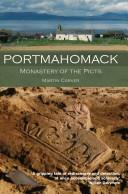
ISBN: 074867070X 1281785733 9786611785734 0748630465 9780748630462 074869997X 9780748699971 9780748670703 0748624414 9780748624416 0748624422 9780748624423 9781281785732 6611785736 Year: 2008 Publisher: Edinburgh : Edinburgh University Press,
Abstract | Keywords | Export | Availability | Bookmark
 Loading...
Loading...Choose an application
- Reference Manager
- EndNote
- RefWorks (Direct export to RefWorks)
A trail of chance finds on the outskirts of Portmahomack during the 19th and 20th centuries culminated in 1996 in the first exposure of a Pictish settlement in northern Scotland. The area soon became the subject of one of the largest research excavations ever to have taken place on the Scottish mainland. Discover the world of the Picts with this unique account of the discovery and excavation of an early monastery. Dating from the 6th to the 9th century AD, Portmahomack is one of the earliest Christian sites to be revealed in Britain and the first in the land of the Picts. The monastery was destroyed between 780 and 830 AD and was then lost to history before being unearthed by Martin Carver and his colleagues. In this highly illustrated book, Martin Carver describes the discovery of the site and the design and execution of the research programme, then traces the events that occurred from the mid-6th century to the 11th century when the parish church was founded on the former monastic site. The book ends with the subsequent history of the church of St Colman and a study of the Tarbat peninsula. The author's conclusions advance the theory that this was a prehistoric place before the monks arrived, and that they marked out the boundaries of their estate in the late 8th century with the lives of local saints carved on some of the greatest stone sculptures of the age.
Excavations (Archaeology) --- Monasteries --- Picts --- Cruithin --- Cruthin --- Celts --- Cloisters (Religious communities) --- Friaries --- Church property --- Religious institutions --- Scriptoria --- Archaeological digs --- Archaeological excavations --- Digs (Archaeology) --- Excavation sites (Archaeology) --- Ruins --- Sites, Excavation (Archaeology) --- Archaeology --- Religion. --- Portmahomack (Scotland) --- Port Mo Chalmaig (Scotland) --- History. --- Church history. --- Antiquities, Celtic.
Book
ISBN: 1315425041 131542505X 1611320267 9781611320268 1611320259 9781611320251 1611320240 9781611320244 9781611320251 9781611320244 9781315425054 9781315425023 9781315425030 1315425033 Year: 2011 Publisher: Walnut Creek Left Coast Press
Abstract | Keywords | Export | Availability | Bookmark
 Loading...
Loading...Choose an application
- Reference Manager
- EndNote
- RefWorks (Direct export to RefWorks)
'Archaeology is for people' is the theme of this book. Split between the academic and commercial sectors, archaeological investigation is also deeply embedded in the needs of local communities, making it simultaneously an art, science and social science. Such a multi-disciplinary discipline needs special methods and creative freedom, not repetitive responses. Carver argues that commercial procedures and academic theory are both suffocating creativity in fieldwork. He'd like to see us bring much more diversity and technical ingenuity to every opportunity, and maintains this is more a matter of
Archaeology --- Archaeologists. --- Antiquities. --- Excavations (Archaeology) --- Archaeological digs --- Archaeological excavations --- Digs (Archaeology) --- Excavation sites (Archaeology) --- Ruins --- Sites, Excavation (Archaeology) --- Archaeological specimens --- Artefacts (Antiquities) --- Artifacts (Antiquities) --- Specimens, Archaeological --- Material culture --- Historians --- Archeology --- Anthropology --- Auxiliary sciences of history --- History --- Antiquities --- Philosophy. --- Social aspects. --- Methodology.
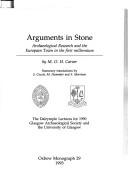
ISBN: 0946897573 Year: 1993 Publisher: Oxford : Oxbow books,
Abstract | Keywords | Export | Availability | Bookmark
 Loading...
Loading...Choose an application
- Reference Manager
- EndNote
- RefWorks (Direct export to RefWorks)
Excavations (Archaeology) --- Urban archaeology --- Europe --- Antiquities.
Book
ISBN: 1846159210 0851156231 Year: 2010 Publisher: Woodbridge ; Rochester, N.Y. : Boydell Press,
Abstract | Keywords | Export | Availability | Bookmark
 Loading...
Loading...Choose an application
- Reference Manager
- EndNote
- RefWorks (Direct export to RefWorks)
The majority of our county towns, and the shires themselves, owe their origins to the campaigns of Alfred and his children Edward the Elder and Aethelflaeda, Lady of the Mercians, in the late 9th and early 10th centuries. Stafford is one such town, and the large-scale archaeological examinations undertaken there over the last fifty years have provided an extraordinary, unique opportunity to piece together the history of such a `typical' town. A centre for the delivery of grain tribute during the Dark Ages, it was commandeered in the tenth century by Aethelflaeda in order to construct a burh there. This new foundation was a fort, provided with a `vicus' in which the centralised production of Roman-style pottery ('Stafford Ware') was undertaken and supplied to the chain of west midlands burhs. The case of Stafford has prompted a new review of the origins of county towns as a whole, and the composition of a new model for the birth of the Anglo-Saxon borough on which the local administration of England has ever since been based.
Excavations (Archaeology) --- Anglo-Saxons --- Stafford (England) --- Great Britain --- History --- Antiquities. --- Saxons --- Archaeological digs --- Archaeological excavations --- Digs (Archaeology) --- Excavation sites (Archaeology) --- Ruins --- Sites, Excavation (Archaeology) --- Archaeology --- Stafford, Eng. --- Stafford (Staffordshire) --- Borough of Stafford (England)
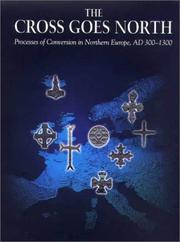
ISBN: 128054600X 9786610546008 1846150582 1903153115 Year: 2003 Publisher: Woodbridge, Suffolk, UK : Rochester, NY : York Medieval Press ; Boydell & Brewer,
Abstract | Keywords | Export | Availability | Bookmark
 Loading...
Loading...Choose an application
- Reference Manager
- EndNote
- RefWorks (Direct export to RefWorks)
37 studies of the adoption of Christianity across northern Europe over1000 years, and the diverse reasons that drove the process. In Europe, the cross went north and east as the centuries unrolled: from the Dingle Peninsula to Estonia, and from the Alps to Lapland, ranging in time from Roman Britain and Gaul in the third and fourth centuries to the conversion of peoples in the Baltic area a thousand years later. These episodes of conversion form the basic narrative here. History encourages the belief that the adoption of Christianity was somehow irresistible, but specialists show theunderside of the process by turning the spotlight from the missionaries, who recorded their triumphs, to the converted, exploring their local situations and motives. What were the reactions of the northern peoples to the Christian message? Why would they wish to adopt it for the sake of its alliances? In what way did they adapt the Christian ethos and infrastructure to suit their own community? How did conversion affect the status of farmers, of smiths, of princes and of women? Was society wholly changed, or only in marginal matters of devotion and superstition? These are the issues discussed here by thirty-eight experts from across northern Europe; some answers come from astute re-readings of the texts alone, but most are owed to a combination of history, art history and archaeology working together. MARTIN CARVER is Professor of Archaeology, University of York.
Conversion --- Christianity --- History --- Europe, Northern --- Church history --- Religious conversion --- Psychology, Religious --- Proselytizing --- Northern Europe --- Christian message. --- Christianity adoption. --- adaptation of Christian ethos. --- alliances. --- conversion process. --- cultural change. --- farmers. --- northern Europe. --- northern peoples' reactions. --- princes. --- smiths. --- society. --- women.
Book
ISBN: 9781846159213 9780851156231 Year: 2010 Publisher: Woodbridge ;Rochester, NY Boydell Press
Abstract | Keywords | Export | Availability | Bookmark
 Loading...
Loading...Choose an application
- Reference Manager
- EndNote
- RefWorks (Direct export to RefWorks)
Digital
ISBN: 9781846150586 Year: 2003 Publisher: Woodbridge, Suffolk, UK :Rochester, NY York Medieval Press ;Boydell & Brewer
Abstract | Keywords | Export | Availability | Bookmark
 Loading...
Loading...Choose an application
- Reference Manager
- EndNote
- RefWorks (Direct export to RefWorks)
Digital
ISBN: 9781846159213 Year: 2010 Publisher: Woodbridge Boydell Press
Abstract | Keywords | Export | Availability | Bookmark
 Loading...
Loading...Choose an application
- Reference Manager
- EndNote
- RefWorks (Direct export to RefWorks)
History of the United Kingdom and Ireland --- anno 400-499 --- anno 500-1199 --- England --- Great Britain --- Japan
| Listing 1 - 10 of 14 | << page >> |
Sort by
|

 Search
Search Feedback
Feedback About UniCat
About UniCat  Help
Help News
News